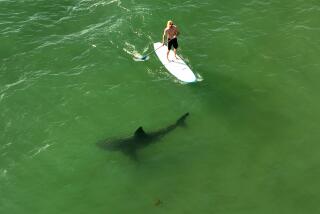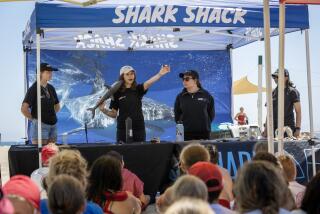1,300-pound shark could be among record catches, official says
If the 1,323-pound mako shark hooked off the coast of Huntington Beach checks out, it would not only set a new world weight record but would also rank in the top half-percent of catches on file, officials said.
Jack Vitek is the world records coordinator for the International Game Fish Assn., the Florida-based group that has regularly tracked world-record catches since 1939, with some dating to the 1860s.
He confirmed that if Mondayâs catch meets the groupâs requirements, it would break the standing mako record set in July 2001, when a 1,221-pound shark was hauled in off the coast of Chatham, Mass.
PHOTOS: Sharks and people -- too close for comfort
It takes about two months for the IGFA to verify domestic catches, Vitek said. The fishermen must submit an application including basic information about the catch, along with photos and the actual tackle used, and the scale must meet requirements. For big catches, he said, witness testimony is usually also required.
And this catch is âenormous,â he said. âAbsolutely.â
Of the 6,850 world records the IGFA has on file, only 23 involve fish topping 1,300 pounds, Vitek said. That means the Huntington Beach mako would fall within the top half-percent.
The largest catch on record was a 2,664-pound great white shark reeled in off the coast of Australia in 1959, Vitek said.
âSeeing a fish over 1,000 pounds -- whether itâs a shark, a tuna or a billfish -- itâs extremely rare,â he said.
Adding to the complexity of the catch is the makoâs speed, he said. The sharks are among the fastest out there.
âTheyâre a very elite game fish, and to have the all-tackle IGFA record is any kind of big game anglerâs dream,â he said. âThere may or may not be anything tangible in terms of financial reward or endorsement, but just having that credit to your name and having that honor is pretty big.â
Kent Williams, who owns the New Fishall Bait Co. in Gardena, where the mako was being held, said the fishermen who caught the shark would be in contact with the IFGA about the potential record.
Williams said the captain of the boat, Matt Potter -- known as âMako Mattâ -- has been a customer for years and buys thousands of dollars worth of bait. About 3 p.m. Monday, Williams received a text from Potter: âI think we got one over a grand, finally.â
At least two videographers involved in an Outdoor Channel reality television show -- âJim Shockeyâs The Professionalsâ -- were on the fishing boat and the massive catch is already being promoted online.
Corey Knowlton, one of the co-hosts of the show, described the shark to KTLA-TV Channel 5: âItâs basically like a giant nightmare swimming around.â
Makos are common off the coast of Southern California, which is considered a ânursery groundâ for the young sharks, according to Nick Wegner, a fisheries research biologist at the Scripps Institution of Oceanography. They tend to stay in open-ocean area -- they donât come to the surf zone and âvery rarely have any interactions with people,â Wegner said, though fishermen commonly catch smaller makos between 2.5 and 6 feet long.
âEncountering one this big is rare,â he said.
David McGuire, director of Shark Stewards, a Bay Area-based nonprofit that advocates for the protection of sharks, said he believed the mako should have been released.
âIâm a little shocked by it,â he said. âItâs really something you see more in Florida than in California, where we have more of a conservation ethic.â
He said he âcertainly would objectâ to a catch set up for a television show.
âPeople should be viewing these sharks as wonderful animals that are important to the ocean and admiring how beautiful they are,â he said, not âspilling their blood and guts.â
âThese kind of reality shows are not reality. The reality is weâre overfishing sharks and this macho big-game attitude should be a relic of the past,â he said. âThis is not entertainment. Itâs not right, in my view.â
Responding to criticism about the catch, Potter said they abided by fishing laws.
âItâs just like any other fishing,â he said. âThe state limit for mako is two per person per day. We only kept one mako for a total of 18 passengers out there three days.â The rest were released, he said.
Another fisherman on board, Jason Johnston, said that catching the shark isnât hurting the population.
âThere are not that may sharks being taken out of the water,â Johnston said. âItâs not hurting the population. If we pull four fish out of the water per year, thatâs just four.â
ALSO:
Compton voters head to polls to vote for new mayor
Businesswoman acquitted of murder in modelâs killing
Safety emphasized after back-to-back deaths at Yosemite
More to Read
Sign up for Essential California
The most important California stories and recommendations in your inbox every morning.
You may occasionally receive promotional content from the Los Angeles Times.












